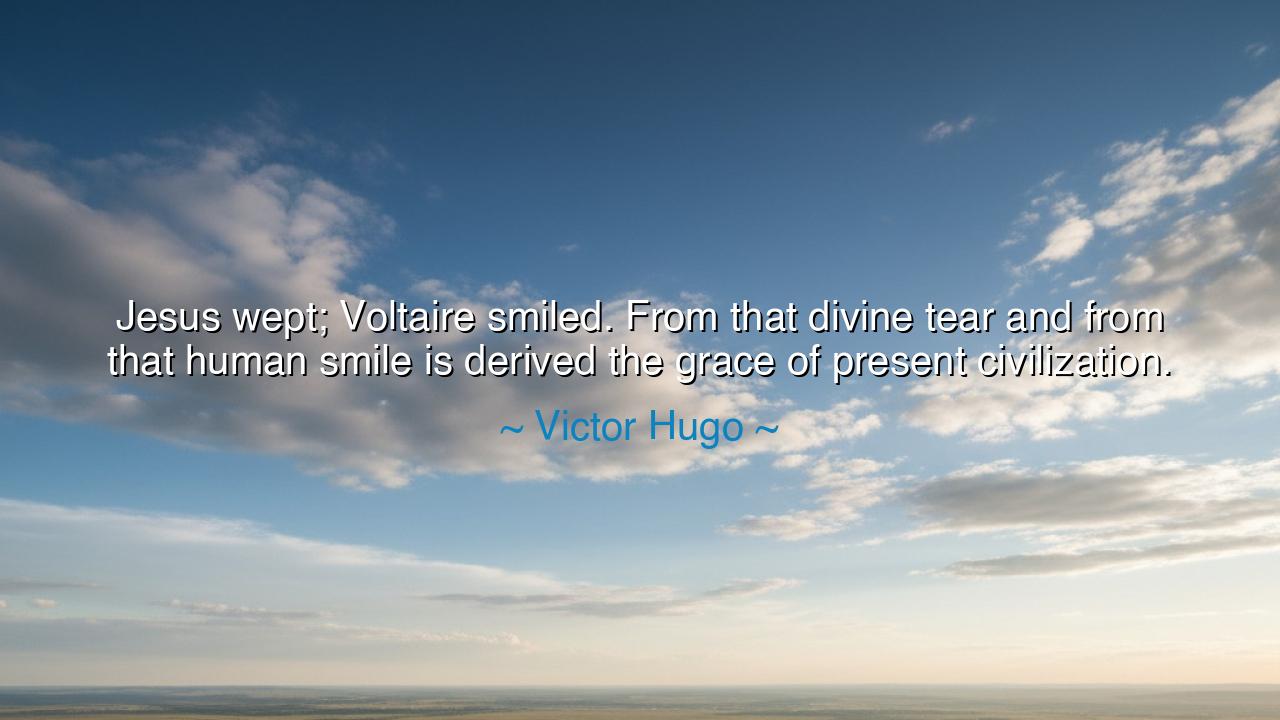
Jesus wept; Voltaire smiled. From that divine tear and from that
Jesus wept; Voltaire smiled. From that divine tear and from that human smile is derived the grace of present civilization.






The words of Victor Hugo—“Jesus wept; Voltaire smiled. From that divine tear and from that human smile is derived the grace of present civilization.”—are both poetic and profound. They bind together two poles of human experience: the sacred sorrow of compassion and the liberating wit of reason. The tear of Jesus is the emblem of divine love, of a heart moved by human suffering. The smile of Voltaire is the emblem of human intellect, of a mind that challenges chains with laughter and wit. Together, they form the twin pillars upon which modern civilization has been built: mercy and freedom, compassion and reason, tenderness and courage.
In the ancient style of teaching, this saying reflects the balance of opposites. Civilization cannot rest upon mercy alone, nor upon reason alone. The tear without the smile would become pure grief, unable to inspire progress. The smile without the tear would risk cruelty, mocking without empathy. But when joined—when compassion softens justice, and reason challenges tyranny—then humanity moves forward. This is the grace of civilization: a harmony between heart and mind, between the divine and the human, between what suffers and what dreams.
Consider the life of Abraham Lincoln, who in many ways embodied Hugo’s teaching. He carried the tear of compassion, weeping privately over the death of countless soldiers, mourning deeply for the pain of a divided nation. Yet he also bore the smile of wit and reason, telling stories and jokes even in the darkest hours, disarming enemies with humor and uplifting the weary with warmth. From this fusion of tenderness and intellect, he led his people through the storm of civil war toward the light of unity and emancipation. His leadership reflected both Jesus’ tear and Voltaire’s smile, and therein lay his greatness.
The origin of Hugo’s thought lies in his own century, when Europe stood between the heritage of faith and the dawn of reason. Hugo, a man of letters and of vision, saw that civilization was shaped neither by religion alone nor by philosophy alone. The Church offered mercy, but often clung to dogma. The philosophers offered reason, but often scorned faith. Yet, he perceived that both were necessary: the tear of love to humanize society, and the smile of reason to liberate it from superstition and oppression. Civilization was not born of one, but of both, united in tension.
This teaching is timeless. For in our own lives, we too must balance the tear and the smile. Too much grief and we fall into despair, paralyzed by sorrow. Too much wit and we risk cynicism, blind to the real pain of others. But when we allow ourselves to weep with those who suffer, and also to smile in the face of adversity, we live as whole beings. Our compassion roots us in humanity; our joy gives us strength to endure and to inspire.
The lesson for us is this: do not despise your tears, nor neglect your smile. When you feel sorrow, let it flow, for it proves the depth of your heart. When you find joy, let it shine, for it proves the resilience of your spirit. In public life, let compassion guide your justice, and let humor temper your pride. For those who can both weep and smile are the builders of civilization, the healers of nations, the teachers of generations.
Practically, this means cultivating both empathy and lightness. Visit the suffering and share their burdens, but do not allow sorrow to extinguish your laughter. Practice humor not as cruelty but as wisdom, lifting spirits while revealing truth. In moments of conflict, seek to balance firmness with kindness, intellect with humanity. If you live thus, you will embody the grace Victor Hugo described: the union of the divine tear and the human smile, the eternal dance of heart and mind that sustains the progress of the world.
Thus, Hugo’s words echo across the centuries: “Jesus wept; Voltaire smiled.” From sorrow and joy, from faith and reason, from heart and wit—civilization finds its grace. And so too will you, if you learn to live in the harmony of both. For a life that only weeps is broken, and a life that only laughs is shallow. But a life that does both is truly human, and in its humanity, truly divine.






AAdministratorAdministrator
Welcome, honored guests. Please leave a comment, we will respond soon